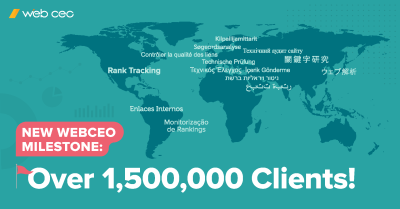
With all of those Google animals approaching us from several directions at once, 2013 was a tough year for us Internet marketers. It feels like 2013 brought more changes to the world of SEO than occurred in the last 10 years. The good news is that everything you learned and implemented this year will be relevant in 2014. The new year 2014 will be the year of mobile SEO and authority. The Google Hummingbird update brought on the age of mobile SEO.
Some underlying changes that happened with Hummingbird, including the increasing importance of both semantic search and the Knowledge Graph, will continue to grow in influence. Search engines are trying to adapt for the rise in popularity of mobile voice search. For Internet marketers, this means that how you structure your content and what content you publish is important.
Next year SEO will be more about holistic marketing than ever. The rules have changed a lot and there are fewer “easy wins.” You have to invest in long term marketing, focus on building your brand, your authority and your online presence slowly.
Fine-tune Your Content
We’ve all gotten used to emphasizing relatively short keywords in titles and headlines, not long tail phrases. In the year 2014, you may want to use longer search phrases to optimize your site for. With the growth of voice search popularity, search engines will learn to process natural language better and natural language will contain more modifying words attached to keywords (how much, where, why, etc). As a marketer you should prepare your website for this. Develop a content marketing strategy and create content that will bring value to your customers.
Measure your content by conversions. Yes, long tail keyword phrases and conversational search queries have lower search volume; but the traffic they bring converts much better. Concentrate on getting the most targeted traffic you can.
Tips:
- Think about topics rather than keywords when you work on your content.
- Answer questions your prospects may ask.
- Make your page’s semantic field wider; use as many synonyms as possible.
- Publish helpful content targeted at your audience regularly.
- Focus on structured data on your web pages.
How WebCEO will help to improve your content:
With the Keyword Tool you can investigate what keywords your competitors use and adapt the most successful practices. The ‘Get Suggestions’ report helps you to research the long tail keyword phrases and possible questions you would like to concentrate on.
Establish & Support Your Website Theme
Sophisticated search engine algorithms take into account not only the content of a page where a keyword is found, but also a complex of interrelations between this page and other pages of the site, and also other sites linking to that page. This helps search engines to understand the theme of a site. Establishing and supporting a website theme means optimization of a website’s structure and internal linking. With the Google Hummingbird update it is now vital to optimize internal links to emphasize keywords and themes that your important pages are optimized for.
Tips:
- Review your most important content-rich pages and fine-tune them to answer questions searchers may ask.
- Analyze how your important pages are linked now and what link texts are used most often. You may want to decrease the number of “read more” or “click here” in favor of more theme-related keyword phrases.
- Optimize your internal links structure to make it easy for search engines to understand every page theme.
How WebCEO will help to establish your site’s theme:
The WebCEO Internal Links Optimization Tool beta is coming soon (late January). This tool will be a great helper for the modern Internet marketer who wants to amplify their search marketing efforts for the up-to-date search engine algorithms. This WebCEO tool will help you analyze the authority of your website’s pages, investigate link texts used and research the link juice each page receives.
Intensify Your Authority
Over the last few years Internet marketers have said a lot about social media authority signals. While social media engagement is important, backlinks continue to reign supreme as the ultimate authority signals.
Think about social media activities as an audience building and communication channel. Social media still can’t substitute for link building yet. Keep reaching out to content authors and publishers; ask them to reference and link to your articles and content. Generate a steady stream of link worthy content to grow your authority. Your task for 2014 is to find the golden mean between social media mentions and the building of good quality backlinks. When you do use social media, remember that likes and shares of content (posts) that include a link to your domain, are considered the most valuable by search engines now.
Tips:
- When building links, make sure the link is placed in a context that is congruent with the theme of the page it links to.
- Get rid of all low quality and toxic link your site has.
- Share your content regularly to receive fresh social signals proving your authority.
- Monitor your ratio of brand mentions to response as soon as possible.
How WebCEO will help to grow your authority:
Use the WebCEO Backlink Quality Checker to be sure your link profile is all nice and shiny. When you have removed all the links you do not want Google to associate you with, start promoting your best content on the web. Use the WebCEO Social Buzz tracker to monitor your brand’s social media engagement and your brand mentions.
The WebCEO Team wishes you a Merry Christmas and a prosperous and eventful New Year. Let the New Year change us and the world for the better!



